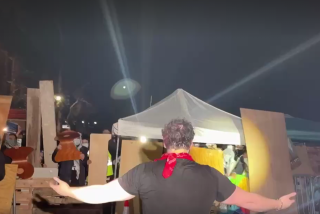Legal actions target patient dumping
Prosecutors filed civil complaints on Tuesday accusing two hospitals and a transportation services firm of dumping homeless patients in downtown Los Angeles, including one highly publicized case in which a paraplegic man wearing a colostomy bag was found crawling in a gutter near a skid row park in February.
The complaints by the L.A. city attorney’s office against Hollywood Presbyterian Medical Center in Los Feliz and Methodist Hospital in Arcadia are related to four separate incidents of alleged patient dumping -- two by each hospital -- over a 14-month period.
Empire Enterprises, whose van driver allegedly left the 54-year-old paraplegic, Gabino Olvera, despite pleas from onlookers, has been named as a co-conspirator.
None of the patients, according to the city attorney’s complaints, “arrived in skid row by accident or by informed choice.” All four were sent downtown, the complaints allege, “without any plan for appropriate medical care and other necessary ancillary services” to allow the hospitals to rid themselves of the trouble and expense of caring for them.
City Atty. Rocky Delgadillo is trying to use a state law concerning unfair business practices, which has been used to prosecute alleged slumlords and which allows a corporation to be sued for unscrupulous behavior, to act against the hospitals. It is a tactic that Delgadillo’s office first warned it might use in December 2005, when it sent a warning letter to several Southern California hospitals, including the two that were accused Tuesday.
The complaints seek fines against the hospitals and a judge’s order to forbid the practice of dumping patients.
Jeffrey B. Isaacs, head of the criminal division in the city attorney’s office and the lead lawyer on its anti-dumping initiative, charged that both hospitals “stonewalled, denied and finger pointed,” and in some cases refused to provide investigators with information on their discharge policies and other individual hospital protocol.
Methodist Hospital issued a statement Tuesday that said officials “would like to have the opportunity to review [the complaint] before making any comments.”
Sitrick and Co., the crisis management firm that is representing Hollywood Presbyterian, said in a statement that Olvera had been treated “appropriately at the hospital and received aftercare instructions, for which he signed....”
The statement also said that Olvera’s drop-off on a skid row street corner was “in violation of hospital policy and something we would never condone. Following this incident we instituted several new policies and intensified training to make sure nothing of the sort happens again.”
Isaacs said that although his office could not criminally prosecute Methodist based on the information it has, it still might seek such action against Hollywood Presbyterian.
The city attorney’s office last year filed false imprisonment and dependent care endangerment charges against Kaiser Permanente -- the nation’s largest nonprofit health maintenance organization -- after Carol Ann Reyes, a 63-year-old patient who was discharged from Kaiser’s Bellflower hospital, was videotaped wandering skid row wearing little more than a hospital gown after being dropped off in the area by taxi in March 2006.
In order to resolve the charges, Kaiser Permanente last month agreed to establish new discharge rules, provide more training for employees and allow a former U.S. attorney to monitor its progress. Under the new rules, physicians, nurses and social workers are required to assess and document homeless patients’ mental status and refer them for cognitive and neurological exams when needed.
Soon after that settlement was announced, Hollywood Presbyterian, which already was being criticized for the Olvera incident, said that it too would adopt the same discharge rules for homeless patients.
But Delgadillo said at the time that Hollywood Presbyterian’s adoption of the rules would have little effect on any legal action by his office.
Andy Bales, chief executive of the Union Rescue Mission, where three of the four patients cited in Tuesday’s complaints eventually arrived, said in an interview that he believed the rate of homeless dumping has declined in recent months due to increased media attention. The cases cited by the city attorney’s office highlighted the need for more recuperative beds for homeless patients in L.A. County, he said. “It’s probably time to quit talking about it and do something significant about it.”
In Sacramento, the Assembly health committee on Tuesday approved a bill that would outlaw patient dumping by hospitals, but with less severe penalties than had been sought by the bill’s sponsor, state Sen. Gil Cedillo (D-Los Angeles). Cedillo said the state’s record of policing hospital dumping was so poor that he wanted prosecutors to be able to bring initial cases rather than be limited to repeat offenders.
“We can’t go to second base without going to first,” he said. “Our goal is to have hospital accountability to make sure hospitals can’t buy their way out of this. At some point it should be a crime.”
Measure SB 275 now proceeds in the Assembly, and whatever is passed by the full body must be reconciled with the Senate version before anything can be sent to Gov. Arnold Schwarzenegger.
richard.winton@latimes.com
Times staff writer Jordan Rau contributed to this report.
More to Read
Start your day right
Sign up for Essential California for news, features and recommendations from the L.A. Times and beyond in your inbox six days a week.
You may occasionally receive promotional content from the Los Angeles Times.







